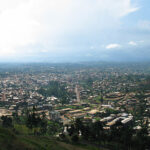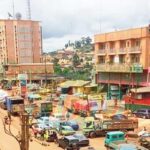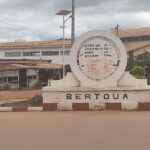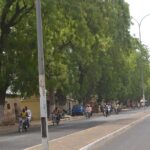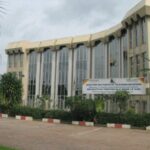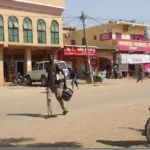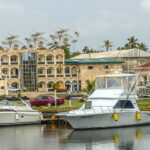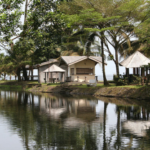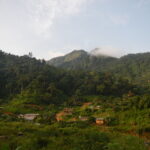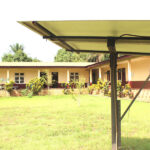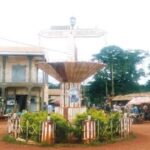Douala

Douala is a city and seaport located in the Littoral region of Cameroon, which is a country in Central Africa. It is the largest city in Cameroon and serves as its economic capital. Douala is located on the Wouri River, about 160 km west of Yaoundé, the political capital of Cameroon.
It is a major commercial centre and the hub of the country’s transportation network. The city has a bustling port that handles most of Cameroon’s imports and exports, including oil, timber, cocoa, and coffee. Douala is also home to a number of industries, including textiles, chemicals, and food processing.
The city has a diverse population, with people from various ethnic groups and nationalities living and working in Douala. French and English are the official languages of Cameroon, but many people in Douala speak the local Cameroonian Pidgin English, as well as other African languages.
The city is a vibrant city with a lively culture and a number of tourist attractions, including the Douala Central Market, the Douala Museum of Art, and the Douala Zoo and Botanical Garden. The city is also known for its nightlife, with a variety of bars, restaurants, and nightclubs catering to both locals and tourists.
Douala has a tropical monsoon climate, which is characterized by high temperatures, high humidity, and heavy rainfall throughout the year. The city experiences two distinct seasons: a rainy season and a dry season.
The rainy season here typically runs from May to October, with the heaviest rainfall occurring in August and September. During this time, the city can experience heavy downpours and thunderstorms, which can cause flooding in some areas. Temperatures during the rainy season range from around 22°C (72°F) to 28°C (82°F).
The dry season in Douala runs from November to April, with relatively little rainfall. However, humidity levels remain high, and temperatures can be quite hot, with average highs ranging from 30°C (86°F) to 33°C (91°F).
Overall, Douala has a warm and humid climate, with an average annual temperature of around 26°C (79°F). It is important to note that the city is located in a region that is prone to tropical diseases such as malaria and yellow fever, so visitors should take appropriate precautions.
Divisions and sub-divisions in Douala
Douala is found in the littoral region of Cameroon and is the head-quarter of the Wouri Division. The Wouri division is divided into six sub-divisions:
- Akwa: This is the historical centre of the city and includes the areas of Bonanjo, Deido, and Bali. It is the commercial and administrative heart of Douala and is home to the major port and railway station.
- Bonabéri: This is the western part of Douala and is home to the Wouri bridge, which connects Douala to the rest of the country.
- Douala 1er: This sub-division is located in the eastern part of the city and includes the areas of New Bell and Nylon.
- Douala 2ème: This sub-division is located in the western part of the city and includes the areas of Bonapriso and Akwa Nord.
- Douala 3ème: This sub-division is located in the eastern part of the city and includes the areas of Makepe and Logbaba.
- Douala 4ème: This sub-division is located in the northern part of the city and includes the areas of Bépanda and Bonaloka.
Each subdivision is further divided into several neighbourhoods, making Douala a diverse and vibrant city with a rich cultural heritage.
About the Douala people
The people of Douala are primarily Bantu-speaking ethnic groups who are part of the larger Sawa ethnic group. The Douala people, also known as Duala or Dwala, are the largest ethnic group in the city and are known for their entrepreneurial spirit and involvement in trade and commerce.
The Douala people have a rich cultural heritage that is expressed through music, dance, and art. The Bikutsi and Makossa music genres, which are popular throughout Cameroon and other parts of Africa, have their roots in Douala. The traditional dances of the Douala people are also vibrant and colorful, and often feature elaborate costumes and masks.
The Douala people were traditionally fishermen and traders, and their expertise in maritime activities has contributed to the development of the city’s major port. They have also been involved in the palm oil industry and other agricultural activities.
Today, the Douala people continue to play an important role in the city’s economy and culture. They are known for their resilience, creativity, and hospitality, and their cultural traditions continue to be celebrated and passed down to younger generations.
Transportation
Douala is linked by rail to Yaoundé, Ngaoundéré, Kumba and Nkongsamba. Douala has a fairly developed road network compared to other cities in Cameroon. However many of the city’s roads have decayed due to years of neglect and corruption. Efforts have recently been made to renovate the city’s roads, especially in the most deprived neighbourhoods. In spite of the numerous domestic and international investments, the roads remain in a deplorable state largely due to embezzlement and corruption.
A tram network is planned for Douala, with the first line projected to open in 2021.
The most common form of public transportation in Douala is the minibus or “Moto-bike.” These moto-bikes operate on fixed routes and can be hailed on the street or picked up at designated taxi stops. They are affordable and convenient but can be overcrowded and uncomfortable, particularly during rush hour.
The Douala International Airport is located in the eastern part of the city. There are direct flights to several European cities, including Paris, Brussels, and Istanbul. Regional and continental destinations include Abidjan, Brazzaville, Dakar, Johannesburg, Kinshasa, Lagos, Malabo, and Nairobi. The airport is the busiest in the CEMAC area and is the hub for Cameroon’s national carrier, Camairco. The airport is in dire need of renovations due to poor circulation and old infrastructure.
The seaport has 8.5 metres (28 feet) of draft.
